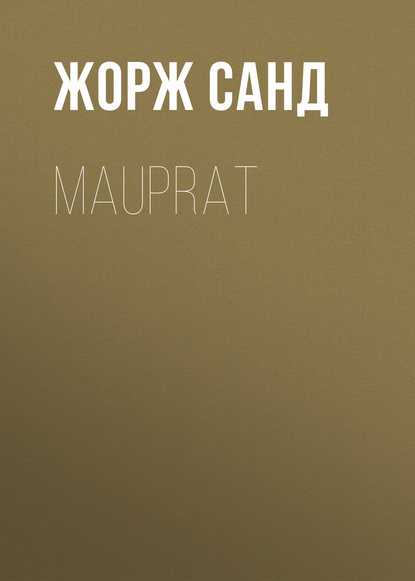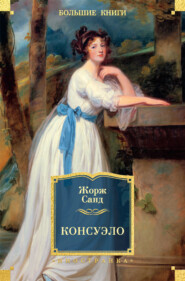По всем вопросам обращайтесь на: info@litportal.ru
(©) 2003-2024.
✖
Mauprat
Настройки чтения
Размер шрифта
Высота строк
Поля
“I will undergo them if necessary,” rejoined the abbe, with an imperceptible smile of pride, and such a dignified bearing that all the women were touched.
Women are excellent judges of things that are delicately beautiful.
“Very good,” replied the public prosecutor. “Do you intend to persist in this course of silence?”
“Perhaps,” replied the abbe.
“Will you tell us whether, during the days that followed this attempt to murder Mademoiselle de Mauprat, you were in a position to hear the words she uttered, either during her delirium or during her lucid intervals?”
“I can give you no information on that point,” answered the abbe. “It would be against my inclinations, and, moreover, in my eyes, an outrage on propriety, to repeat words which, in the case of delirium, could prove absolutely nothing, and, if uttered in a lucid moment, could only have been the outpouring of a genuinely filial affection.”
“Very good,” said the King’s advocate, rising. “We shall call upon the Court to deliberate on your refusal of evidence, taking this incident in connection with the main question.”
“And I,” said the president, “in virtue of my discretionary power, do order that Aubert be meanwhile arrested and taken to prison.”
The abbe allowed himself to be led away with unaffected calmness. The spectators were filled with respect, and a profound silence reigned in court, in spite of the bitter efforts of the monks and cures, who continued to revile the heretic in an undertone.
When the various witnesses had been heard (and I must say that those who had been suborned played their part very feebly in public), to crown all, Mademoiselle Leblanc appeared. I was surprised to find the old maid so bitter against me and able to turn her hatred to such account. In truth, the weapons she could bring against me were only too powerful. In virtue of the right which domestics claim to listen at doors and overhear family secrets, this skilled misinterpreter and prolific liar had learnt and shaped to her own purposes most of the facts in my life which could be utilized for my ruin. She related how, seven years before, I had arrived at the chateau of Sainte-Severe with Mademoiselle de Mauprat, whom I had rescued from the roughness and wickedness of my uncles.
“And let that be said,” she added, turning toward John Mauprat with a polite bow, “without any reference to the holy man in this court, who was once a great sinner, and is now a great saint. But at what a price,” she continued, facing the judges again, “had this miserable bandit saved my dear mistress! He had dishonoured her, gentlemen; and, throughout the days that followed, the poor young lady had abandoned herself to grief and shame on account of the violence which had been done her, for which nothing could bring consolation. Too proud to breath her misfortune to a single soul, and too honest to deceive any man, she broke off her engagement with M. de la Marche, whom she loved passionately, and who returned her passion. She refused every offer of marriage that was made her, and all from a sense of honour, for in reality she hated M. Bernard. At first she wanted to kill herself; indeed, she had one of her father’s little hunting-knives sharpened and (M. Marcasse can tell you the same, if he chooses to remember) she would certainly have killed herself, if I had not thrown this knife into the well belonging to the house. She had to think, too, of defending herself against the night attacks of her persecutor; and, as long as she had this knife, she always used to put it under her pillow; every night she would bolt the door of her room; and frequently I have seen her rush back, pale and ready to faint, quite out of breath, like a person who has just been pursued and had a great fright. When this gentleman began to receive some education, and learn good manners, mademoiselle, seeing that she could never have any other husband, since he was always talking of killing any man who dared to present himself, hoped he would get rid of his fierceness, and was most kind and good to him. She even nursed him during his illness; not that she liked and esteemed him as much as M. Marcasse was pleased to say in his version; but she was always afraid that in his delirium he might reveal, either to the servants or her father, the secret of the injury he had done her. This her modesty and pride made her most anxious to conceal, as all the ladies present will readily understand. When the family went to Paris for the winter of ‘77, M. Bernard became jealous and tyrannical and threatened so frequently to kill M. de la Marche that mademoiselle was obliged to send the latter away. After that she had some violent scenes with Bernard, and declared that she did not and never would love him. In his rage and grief – for it cannot be denied that he was enamoured of her in his tigerish fashion – he went off to America, and during the six years he spent there his letters seemed to show that he had much improved. By the time he returned, mademoiselle had made up her mind to be an old maid, and had become quite calm again. And M. Bernard, too, seemed to have grown into a fairly good young gentleman. However, through seeing her every day and everlastingly leaning over the back of her arm-chair, or winding her skeins of wool and whispering to her while her father was asleep, he fell so deeply in love again that he lost his head. I do not wish to be too hard on him, poor creature! and I fancy his right place is in the asylum rather than on the scaffold. He used to shout and groan all night long; and the letters he wrote her were so stupid that she used to smile as she read them and then put them in her pocket without answering them. Here is one of these letters that I found upon her when I undressed her after the horrible deed; a bullet has gone through it, and it is stained with blood, but enough may still be read to show that monsieur frequently intended to kill mademoiselle.”
So saying, she put down on the table a sheet of paper half burnt and half covered with blood, which sent a shudder through the spectators – genuine with some of them, mere affectation with many others.
Before this letter was read, she finished her deposition, and ended it with some assertions which perplexed me considerably; for I could no longer distinguish the boundary between truth and perfidy.
“Ever since her accident,” she said, “mademoiselle has been hovering between life and death. She will certainly never recover, whatever the doctors may declare. I venture to say that these gentlemen, who only see the patient at certain hours, do not understand her illness as well as I, who have never left her for a single night. They pretend that her wounds are going on well and that her head is deranged; whereas I say that her wounds are going on badly, and that her head is better than they say. Mademoiselle very rarely talks irrationally, and if by chance she does, it is in the presence of these gentlemen, who confuse and frighten her. She then makes such efforts not to appear mad that she actually becomes so; but as soon as they leave her alone with me or Saint-Jean or Monsieur l’Abbe, who could quite well have told you how things are, if he had wished, she becomes calm again, and sweet and sensible as usual. She says that she could almost die of pain, although to the doctors she pretends that she is scarcely suffering at all. And then she speaks of her murderer with the generosity that becomes a Christian; a hundred times a day she will say:
“‘May God pardon him in the next life as I pardon him in this! After all, a man must be very fond of a woman to kill her! I was wrong not to marry him; perhaps he would have made me happy. I drove him to despair and he has avenged himself on me. Dear Leblanc, take care never to betray the secret I have told you. A single indiscreet word might send him to the scaffold, and that would be the death of my father.’
“The poor young lady is far from imagining that things have come to this pass; that I have been summoned by the law and my religion to make known what I would rather conceal; and that, instead of going out to get an apparatus for her shower-baths, I have come here to confess the truth. The only thing that consoles me is that it will be easy to hide all this from M. le Chevalier, who has no more sense now than a babe just born. For myself, I have done my duty; may God be my judge!”
After speaking thus with perfect self-possession and great volubility, Mademoiselle Leblanc sat down again amid a murmur of approbation, and they proceeded to read the letter which had been found on Edmee.
It was, indeed, the one I had written to her only a few days before the fatal day. They handed it to me; I could not help pressing my lips to the stains of Edmee’s blood. Then, after glancing at the writing, I returned the letter, and declared quite calmly that it was written by me.
The reading of this letter was my coup de grace. Fate, who seems ingenious in injuring her victims, had obtained (and perhaps some famous hand had contributed to the mutilation) that the passages expressing my obedience and respect should be destroyed. Certain poetic touches which might have furnished an explanation of, and an excuse for, my wild ramblings, were illegible. What showed plain to every eye, and carried conviction to every mind, were the lines that remained intact, the lines that bore witness to the violence of my passion and the vehemence of my frenzy. They were such phrases as these: “Sometimes I feel inclined to rise in the middle of the night and go and kill you! I should have done this a hundred times, if I had been sure that I should love you no more after your death. Be considerate; for there are two men in me, and sometimes the brigand of old lords it over the new man, etc.” A smile of triumph played about my enemies’ mouths. My supporters were demoralized, and even my poor sergeant looked at me in despair. The public had already condemned me.
This incident afforded the King’s advocate a fine chance of thundering forth a pompous address, in which he described me as an incurable blackguard, as an accursed branch of an accursed stock, as an example of the fatality of evil instincts. Then, after exerting himself to hold me up as an object of horror and fear, he endeavoured, in order to give himself an air of impartiality and generosity, to arouse the compassion of the judges in my favour; he proceeded to show that I was not responsible for my actions; that my mind had been perverted in early childhood by foul sights and vile principles, and was not sound, nor ever could have been, whatever the origin and growth of my passions. At last, after going through a course of philosophy and rhetoric, to the great delight of the audience, he demanded that I should be condemned to privation of civil rights and imprisonment for life.
Though my counsel was a man of spirit and intelligence, the letter had so taken him by surprise, the people in court were so unfavourably disposed towards me, and the judges, as they listened to him, so frequently showed signs of incredulity and impatience (an unseemly habit which appears to be the heritage of the magisterial benches of this country), that his defence was tame. All that he seemed justified in demanding with any vigour was a further inquiry. He complained that all the formalities had not been fulfilled; that sufficient light had not been thrown on certain points in the case; that it would be showing too much haste to give a verdict when several circumstances were still wrapped in mystery. He demanded that the doctors should be called to express an opinion as to the possibility of taking Mademoiselle de Mauprat’s evidence. He pointed out that the most important, in fact the only important, testimony was that of Patience, and that Patience might appear any day and prove me innocent. Finally, he demanded that they should order a search to be made for the mendicant friar whose resemblance to the Mauprats had not yet been explained, and had been sworn to by trustworthy witnesses. In his opinion it was essential to discover what had become of Antony Mauprat, and to call upon the Trappist for information on this point. He complained bitterly that they had deprived him of all means of defence by refusing any delay; and he had the courage to assert that some evil passions must be responsible for such blind haste as had marked the conduct of this trial. On this the president called him to order. Then the King’s advocate replied triumphantly that all formalities had been fulfilled; that the court was sufficiently enlightened; that a search for the mendicant friar would be a piece of folly and in bad taste, since John Mauprat had proved his last brother’s death, which had taken place several years before. The court retired to deliberate; at the end of half an hour they came back with a verdict condemning me to death.
XXVI
Although the haste with which the trial had been conducted and the severity of the sentence were iniquitous, and filled those who were most bitter against me with amazement, I received the blow with supreme indifference; I no longer felt an interest in anything on earth. I commended my soul and the vindication of my memory to God. I said to myself that if Edmee died I should find her again in a better world; that if she survived me and recovered her reason, she would one day succeed in discovering the truth, and that then I should live in her heart as a dear and tender memory. Irritable as I am, and always inclined to violence in the case of anything that is an obstacle or an offence to me, I am astonished at the philosophical resignation and the proud calm I have shown on the momentous occasions of life, and above all on this one.
It was two o’clock in the morning. The case had lasted for fourteen hours. A silence as of death reigned over the court, which was as full and as attentive as at the beginning, so fond are mortals of anything in the nature of a show. That offered by the criminal court at this moment was somewhat dismal. Those men in red robes, as pale and stern and implacable as the Council of Ten at Venice; those ghosts of women decked with flowers, who, by the dim light of the tapers, looked like mere reflections of life hovering in the galleries above the priests of death; the muskets of the guard glittering in the gloom in the back of the court; the heart-broken attitude of my poor sergeant, who had fallen at my feet; the silent but vast delight of the Trappist, still standing unwearied near the bar; the mournful note of some convent bell in the neighbourhood beginning to ring for matins amid the silence of the assembly – was not all this enough to touch the nerves of the wives of the farmers-general and to send a thrill through the brawny breasts of the tanners in the body of the court?
Suddenly, just as the court was about to disperse, a figure like that of the traditional peasant of the Danube – squat, rugged, barefooted, with a long beard, dishevelled hair, a broad, grave brow, and a stern, commanding glance – rose in the midst of the flickering reflections by which the hall was half lighted, and standing erect before the bar, said in a deep, striking voice:
“I, Jean le Houx, known as Patience, oppose this judgment as iniquitous in substance and illegal in form. I demand that it be revised, so that I may give my evidence, which is necessary, may be of sovereign importance, and should have been waited for.”
“If you had anything to say,” cried the King’s advocate, in a passion, “why did you not present yourself when you were summoned. You are imposing on the court by pretending that you have important evidence to give.”
“And you,” answered Patience, more slowly and in an even deeper tone than before, “you are imposing on the public by pretending that I have not. You know well enough that I must have.”
“Remember where you are, witness, and to whom you are speaking.”
“I know too well, and I shall not say too much. I hereby declare that I have some important things to say, and that I should have said them at the right time, if you had not done violence to the time. I wish to say them, and I shall; and, believe me, it is better that I should make them known while it is still possible to revise these proceedings. It is even better for the judges than the prisoner; for the one comes to life again in honour, as soon as the others die in infamy.”
“Witness,” said the irritated magistrate, “the virulence and impertinence of your language will be prejudicial rather than advantageous to the prisoner.”
“And who says that I am favourable to the prisoner?” said Patience in a voice of thunder. “What do you know about me? What if it pleases me to change an illegal and worthless verdict into one which is legal and irrevocable?”
“But how can you reconcile this desire to see the laws respected,” said the magistrate, genuinely moved by Patience’s powerful personality, “with your own breach of them in not appearing when summoned by the public prosecutor?”
“I did not wish to appear.”
“Severe penalties may be inflicted on those whose wishes are not in harmony with the laws of the land.”
“Possibly.”
“Have you come here to-day with the intention of submitting to them?”
“I have come to see that you respect them.”
“I warn you that, if you do not change your tone, I shall have you taken off to prison.”
“And I warn you that, if you love justice and serve God, you will listen to me and suspend the execution of this sentence. It is not for him who brings truth to humble himself before those who should be seeking it. But you who are listening to me now, you men of the people, whom I will not accuse the great of wishing to dupe, you whose voice is called ‘the voice of God,’ side with me; embrace the cause of truth, that truth which is in danger of being stifled under false outward shows, or else is about to triumph by unfair means. Go down on your knees, you men of the people, my brothers, my children; pray, implore, require that justice be done and anger repressed. It is your duty, it is your right, and to your own interest; for it is you who are insulted and threatened when laws are violated.”
Patience spoke with so much warmth, and his sincerity was so strikingly manifest, that a thrill of sympathy ran through the whole audience. At that time, philosophy was too fashionable with the young men of quality for these not to be among the first to respond to an appeal, though addressed to others than themselves. They rose with chivalrous enthusiasm and turned round to the people, who, carried away by their noble example, rose likewise. There was a wild uproar, and one and all, conscious of their dignity and power, cast away personal prejudices in order to combine for their common rights. Thus, a noble impetuosity and a true word are sometimes sufficient to bring back the masses who have long been led astray by sophism.
A respite was granted, and I was led back to my prison amid the applause of the people. Marcasse followed me. Patience disappeared without giving me a chance to thank him.
The revision of the sentence could not be made without an order from the high court. For my own part, before the verdict was given I had resolved to make no appeal to this court of cassation of the old jurisprudence. But Patience’s bearing and words had had as much effect on my mind as on the minds of the spectators. The spirit of resistance and the sense of human dignity, dulled in me and paralyzed, as it were, by grief, suddenly awoke again, and in this hour I realized that man is not made for that selfish concentration of despair which is known as resignation or stoicism. No man can cease to have a regard for his own honour without at the same time ceasing to feel the respect due to the principle of honour. If it is grand to sacrifice personal glory and life to the mysterious decrees of conscience, it is cowardly to abandon both to the fury of an unjust persecution. I felt that I had risen in my own estimation, and I passed the rest of this momentous night in devising means of vindicating myself, with as much persistence as I had previously displayed in abandoning myself to fate. With this feeling of energy I could feel hope springing up anew. Edmee, perhaps, was neither mad nor mortally wounded. She might acquit me; she might recover.
“Who knows?” I said to myself. “Perhaps she has already done me justice. Perhaps it was she who sent Patience to my rescue. Undoubtedly I shall best please her by taking courage again, and not letting myself be crushed by a set of knaves.”
But how was I to obtain this order from the high court? It needed a special mandate from the King; who would procure this? Who would cut short those odious delays which the law can introduce at will into the very cases that it has previously hurried on with blind precipitation? Who would prevent my enemies from injuring me and paralyzing all my efforts? In a word, who would fight for me? The abbe alone could have taken up my cause; but he was already in prison on my account. His generous behaviour in the trial had proved that he was still my friend, but his zeal was now fettered. And what could Marcasse do, hampered by his humble birth and enigmatical language? Evening came, and I fell asleep in the hope that help would be sent from on high; for I had prayed to God with my whole soul. A few hours of sleep refreshed me; I was aroused by the noise of bolts being drawn at the other side of my door. O God of goodness! what was my delight on seeing Arthur, my brother in arms, my other self, the man from whom I had had no secret for six long years! I wept like a child on receiving this mark of love from Providence. Arthur did not believe me guilty! Scientific matters connected with the library at Philadelphia had taken him to Paris, where he had heard of this sad affair in which I was implicated. He had broken a lance with all who attacked me, and had not lost a moment in coming to offer help or consolation.
In a transport of joy I poured out my soul to him, and then explained how he could assist me. He wanted to take the coach for Paris that very evening; but I implored him to go to Sainte-Severe first of all to get news of Edmee. Four mortal days had passed since I had received any; and, moreover, Marcasse had never given me such exact details as I could have wished.
“Ease your mind,” said Arthur. “I will undertake to bring you the truth. I am a pretty good surgeon; and I have a practised eye. I shall be able to give you some idea of what you have to hope or fear. From Sainte-Severe I shall go straight to Paris.”
Two days later I received a long letter from him giving full details about Edmee.
Her condition was extraordinary. She did not speak, nor did she appear to be in pain as long as nothing happened to excite her nerves; but on the first word which stirred up recollections of her troubles she would be seized with convulsions. Her moral isolation formed the greatest obstacle to recovery. Physically she wanted for nothing; she had two good doctors and a most devoted nurse. Mademoiselle Leblanc likewise was very zealous in her attentions, though this dangerous woman often gave her pain by untimely remarks and indiscreet questions. Furthermore, Arthur assured me that, if ever Edmee had thought me guilty and had expressed an opinion on this point, it must have been in some previous phase of her illness; for, during the last fortnight at least, she had been in a state of complete torpor. She would frequently doze, but without quite falling asleep; she could take liquid food and jellies, nor did she ever complain. When her doctors questioned her about her sufferings she answered by careless signs and always negatively; and she would never give any indication that she remembered the affections which had filled her life. Her love for her father, however, that feeling which had always been so deep and powerful in her, was not extinct; she would often shed copious tears; but at such a time she seemed to be deaf to all sounds; in vain would they try to make her understand that her father was not dead, as she appeared to believe. With a gesture of entreaty she would beg them to stop, not the noise (for that did not seem to strike her ear), but the bustle that was going on around her; then, hiding her face in her hands, lying back in her arm-chair and bringing her knees up almost to her breast, she would apparently give way to inconsolable despair. This silent grief, which could no longer control itself and no longer wished to be controlled; this powerful will, which had once been able to quell the most violent storms, and now going adrift on a dead sea and in an unruffled calm – this, said Arthur, was the most painful spectacle he had ever beheld. Edmee seemed to wish to have done with life. Mademoiselle Leblanc, in order to test her and arouse her, had brutally taken upon herself to announce that her father was dead; she had replied by a sign that she knew. A few hours later the doctors had tried to make her understand that he was alive; she had replied by another sign that she did not believe them. They had wheeled the chevalier’s arm-chair into her room; they had brought father and daughter face to face and the two had not recognised each other. Only, after a few moments, Edmee, taking her father for a ghost, had uttered piercing cries, and had been seized with convulsions that had opened one of her wounds again, and made the doctors tremble for her life. Since then, they had taken care to keep the two apart, and never to breathe a word about the chevalier in Edmee’s presence. She had taken Arthur for one of the doctors of the district and had received him with the same sweetness and the same indifference as the others. He had not dared to speak to her about me; but he extorted me not to despair. There was nothing in Edmee’s condition that time and rest could not triumph over; there was but little fever left; none of her vital organs were really affected; her wounds were almost healed; and it did not seem as if her brain were in such an excited condition that it would be permanently deranged. The weak state of her mind, and the prostration of all the other organs could not, according to Arthur, long withstand the vitality of youth and the recuperative power of an admirable constitution. Finally, he advised me to think of myself; I might help towards her recovery, and I might again find happiness in her affection and esteem.
In a fortnight Arthur returned from Paris with an order from the King for the revision of my sentence. Fresh witnesses were heard. Patience did not appear; but I received a note from him containing these words in a shapeless hand, “You are not guilty, so don’t despair.” The doctors declared that Mademoiselle de Mauprat might be examined without danger, but that her answers would have no meaning. She was now in better health. She had recognised her father, and at present would never leave him; but she could understand nothing that was not connected with him. She seemed to derive great pleasure from tending him like a child, and, on his side, the chevalier would now and then recognise his beloved daughter; but his vital powers were visibly decaying. They questioned him in one of his lucid moments. He replied that his daughter had, indeed, fallen from her horse while hunting, and that she had torn her breast on the stump of a tree, but that not a soul had fired at her, even by mistake, and that only a madman could possibly believe her cousin capable of such a crime. This was all the information they could draw from him. When they asked him what he thought of his nephew’s absence, he answered that his nephew was still in the house, and that he saw him every day. Was it that, in his devotion to the good name of a family – alas! so compromised – he thought to defeat the aims of justice by childish lies? This is a point I was never able to ascertain. As for Edmee, it was impossible to examine her. At the first question that was asked her, she shrugged her shoulders and made a sign that she did not wish to be bothered. As the public prosecutor insisted and became more explicit, she stared at him and seemed to be making an effort to understand. He pronounced my name, she gave a loud cry and fainted. He had to abandon all thoughts of taking her evidence. However, Arthur did not despair. On the contrary, the account of this scene made him think that Edmee’s mental faculties might be about to take a favourable turn. He immediately returned to Sainte-Severe, where he remained several days without writing to me, which caused me great anxiety.

















